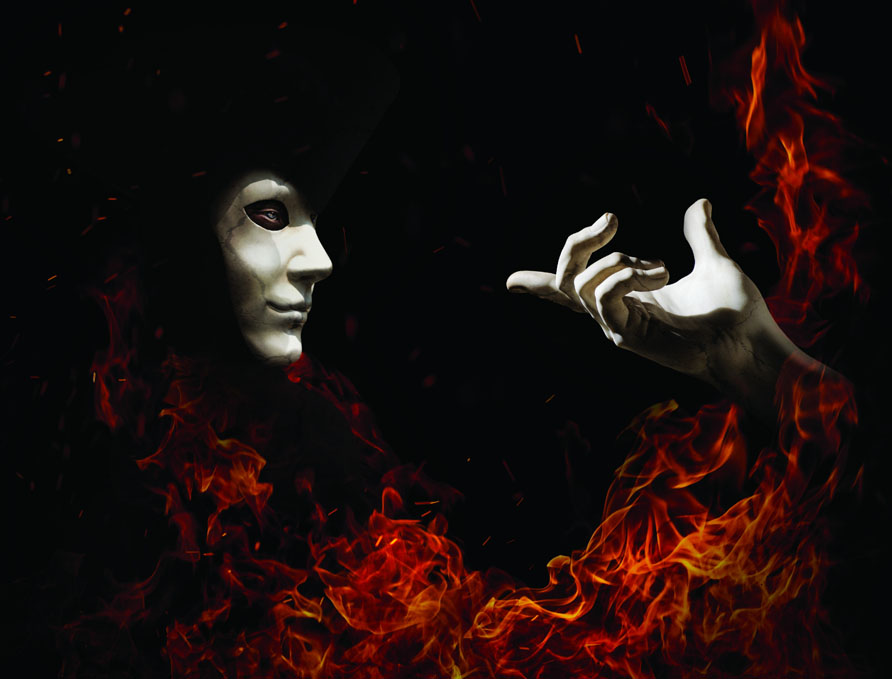
Opera Project return triumphantly to Tobacco Factory Theatres with this hugely impressive interpretation of Don Giovanni. The singing is uniformly glorious and particularly noteworthy for the clarity of diction, for every word of Amanda Holden’s translation is heard. We hear Da Ponte’s original Italian only once, when Giovanni serenades Elvira’s maid. Hearing Deh vieni alla finestra is a reminder, if one is needed, of the beauty of Da Ponte’s libretto. But Holden has produced a wonderfully robust and witty English version, often employing contemporary idioms for comic effect.
There certainly is comedy, often of the laugh-out-loud kind, though the overall tone is most certainly dark. We are left in no doubt that the Don is a nasty piece of work, even if we are sometimes amused by his outrageous bravado. When George von Bergen’s Don is not being persuasively seductive he is often being vicious, and in his final rejection of the hopelessly conflicted Donna Elvira we see him at his most ruthless. This may be an opera buffo, but it is one with weighty themes that demand to be taken seriously. Benjamin Cahn plays the resourceful, quick-witted Leporello as a servant who often takes a great deal of vicarious pleasure in his master’s exploits, but who fears him too. It is perhaps only his lack of courage that prevents him from being as big a villain. Cahn’s performance of the famous catalogue aria makes it all too clear that the Don’s adventures are decidedly more carnal than romantic. He is wickedly funny as he gleefully recounts his master’s misdeeds before an appalled Donna Elvira. When set against the antics of these two rogues the role of Don Ottavio can seem rather pale and uninteresting, but William Wallace brings great intensity to the part. His declaration of his love for Donna Anna in Act II, when he sings of how Donna Anna’s unhappiness ‘darkens the sun’, is one of the very best moments in a production that is not short of highlights.
The moral centre of the drama lies with Donna Anna, determined to avenge the death of her father. Anna Patalong plays this role with an impressive, quiet dignity. Her singing of the aria (Troppo mi… Non mi dir in the original) where she persuades Don Ottavio to accept that she cannot marry him until she finds justice is deeply moving. Equally impressive is Elin Pritchard as Donna Elvira, a woman who is appalled by Don Giovanni’s behaviour, yet who cannot stop loving him. Pritchard conveys her turmoil with great conviction. This is a Donna Elvira who never seems silly in her devotion to the Don, but one who elicits our sympathy for her plight. In contrast to these aristocratic ladies there is the flirtatious peasant girl Zerlina, much less secure in her moral convictions. Laura Ruhi Vidal is a delightfully coquettish Zerlina, and her stormy relationship with Bradley Travis’s bemused Masetto is the source of much fun. Their comically sensual reconciliation scene is yet another memorable moment.
Jonathan Lyness is both conductor of the eleven-piece orchestra and the creator of an adroitly reduced version of the score. Perhaps the depth and volume of a full orchestra is missed in the opening chords of the overture, but from then on there is little or no sense of a lack of weight or texture in the sound. Speaking of depth and volume, Donald Thompson is a marvellously stentorian as the Commendatore; when he finally confronts Giovanni his dark, resonant sound is truly spine-tingling.
There is so much to praise in this Don Giovanni, not least Matt Graham’s very effective lighting design which employs no less than twenty glittering chandeliers. Director Richard Studer has been well served by a cast who can act as well as they can sing, and he has exploited these talents to the full. I have one minor quibble with his design. When the familiar overture strikes up we see an elderly gentleman at a writing desk. We discover that this is none other than Leporello in old age, writing his memoirs, and the opera itself is presented as if his recollections are being acted out before him. In some ways this is a clever device that works well, but for much of the time he has little to do other than to sit and observe, which leaves Arwel Huw Morgan rather underused in the role. That aside, this is unequivocally a superb show packed with five-star performances. I cannot recommend it too highly. ★★★★★ Mike Whitton 8th October 2016

